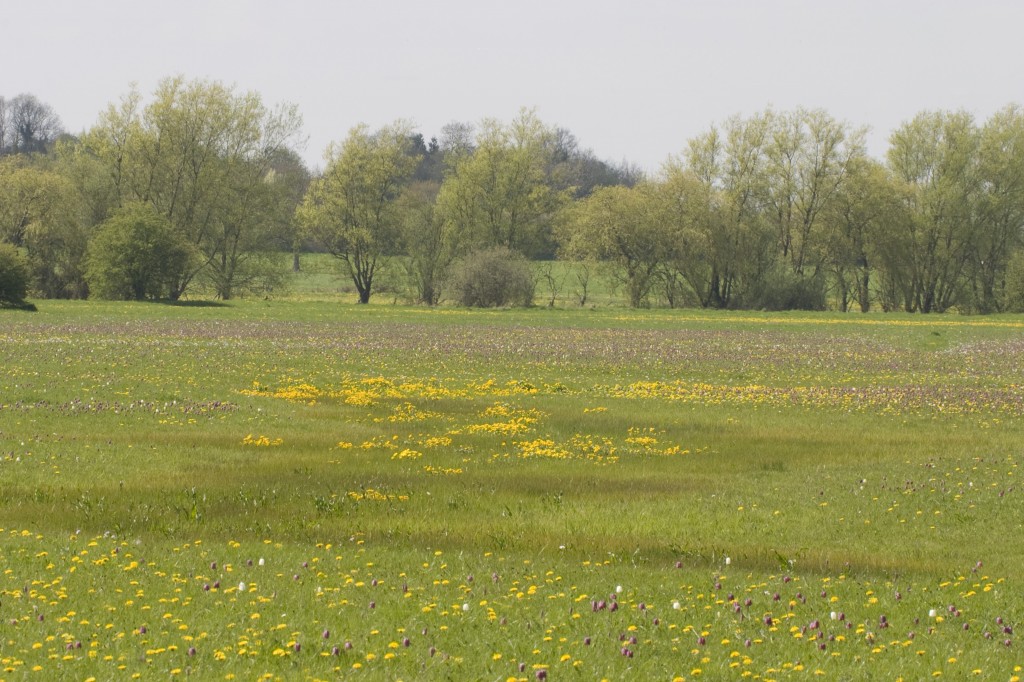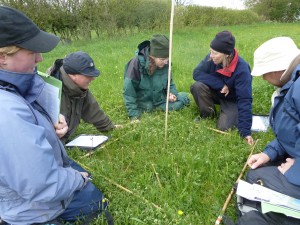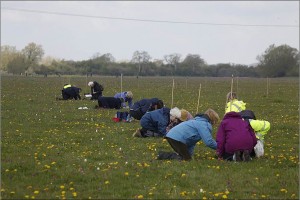This post was jointly authored by Emma Rothero, Gareth Davies and Jim McGinlay
We applied to the OU’s Engaging Research Seed Funding Scheme based, in part, on the track record of engagement built up over a number of years through the Floodplain Meadows Partnership. In participating in this scheme as part of the OU’s Public Engagement with Research Catalyst we wanted to share some of our experiences in generating evidence of the impacts from engaged research. Of course, we also wanted to learn from other researchers trying to achieve the same ends.
Project aims
The aims of our study were to understand:
- the role of site-specific advice provided by the Floodplain Meadows Partnership, in the process of translating scheme goals to practical actions;
- the extent to which the government funded HLS agri-environment schemes benefit species-rich floodplain meadows;
- the effectiveness of these schemes in creating new species-rich floodplain meadows.
Project Summary
16 semi-structured telephone interviews were carried out by the Floodplain Meadows Partnership (FMP) with site managers of floodplain meadows in England to determine the impact of advice given by the FMP during site visits, and of the government’s agri-environment scheme (Higher Level Scheme; HLS) on meadow management and restoration.
The interviews demonstrated that the HLS scheme benefits site management and that the input of the FMP was invaluable in helping to determine management and support site managers.
The response of Natural England (agri-environment scheme managers) to the findings was very positive noting that the Partnership was providing excellent technical advice and support.
Approach
Since the Floodplain Meadows Partnership (FMP) started, it has carried out over 70 site visits across England and Wales, resulting in nearly 50 letters containing advice and recommendations for site managers. Some of these sites are entered in to a government funded agri-environment scheme to deliver good habitat management or restoration.
The project we outline here involved telephone interviews with site managers of 16 such sites to understand how the advice had been received, whether it had been implemented, and whether the relationship of the advice to the meadow management scheme goals where applicable.
A contractor was employed to identify potential case study sites, design a semi-structured interview schedule (see the Resources below), conduct the interviews and analyse the responses. The interview schedule followed a basic standard of a semi-structured interview, allowing flexibility to explore particular issues of interest in greater depth if necessary.
Once the interview schedule was designed, and permission from the OU’s Human Research Ethics Committee was established, potential site managers were emailed with the background to the project, the proposed interview questions and consent forms asking for their permission to record the interviews.
Site managers were able to arrange the interviews to suit their availability throughout the period September 2014-January 2015. All but one interview was recorded and transcribed (in one case permission was not given for digitally audio recording). The interviews were completed as scheduled. A final interview was then proposed with a national representative of Natural England (the organisation that manages the agri-environment scheme) in order to establish their view on a summary from the findings of the interviews with site managers.
In addition to the seed funding from the Public Engagement with Research Catalyst, Natural England were approached to support some additional elements of the project, including funding botanical surveys as a follow-up to the interviews.
The surveys demonstrated that the site-specific advice provided by the FMP had a positive impact on manager’s understanding of their meadow. At one site the manager said they had not noticed the meadow’s decline until the Floodplain Meadows Partnership had visited, at another site the advice had ‘galvanised’ management proposals into action.
Overall, the opinion of the FMP’s advice as expressed by managers is overwhelmingly positive, described as clear and practicable. Managers noted that the site visits were useful learning exercises, complementing the Partnership’s other activities such as training courses and meetings.
Where the meadow was enrolled in an HLS scheme, all of the managers considered the scheme to be beneficial to meadow management by providing security of funding for management activities. At three of these sites the managers explicitly stated that the meadow management might not happen without HLS funding.
In responding to the findings, Natural England expressed some surprise over some responses, including the lack of flexibility in the HLS agreements over hay cutting times and that some managers felt they were entered into the wrong options. The most significant element of the findings were regarded as the importance of having an expert third party to provide advice (in a world where NE’s own resources are too limited to undertake similar evaluation), and the early indications that FMPs advice had such a positive impact on the conditions of the sites.
Lessons learned
During the seed funding period we learnt that it is important to allow enough time for each stage of the process. Interviewees are busy and you need to allow several months to sort out dates for interviews to suit everyone. We did achieve this, but it took longer than we’d initially planned to complete. This left less time than we had hoped for the analysis of the transcripts, which had the potential to provide some further useful insights.
It was useful to work with a contractor who could schedule interviews flexibly to suit site managers and was not too beset by other commitments.
The application process for the Human Research and Ethics Committee (HREC) was reasonably straightforward, but required paperwork to be appropriately completed before the process went ahead. Our advice to others is to make sure sufficient time is allowed for this. Our project was low risk, but a more complicated application could have been more problematic.
The timing of the project meant that we have been unable to complete the second phase in time to report fully at this stage, as the botanical surveys can’t be carried out until June, 2015.
The findings of the seed funding have not affected research to date, but they may well do once the botanical data are available. They have provided further insight into how managers perceive their sites, which has allowed us to better tailor our information and advice. For example, at a recent training course (Floodplain Meadows Partnership Ambassadors, a two-year vocational course aimed at professional conservation advisors), we emphasised the deleterious effects of waterlogging because it was clear that some managers surveyed in this exercise had not fully appreciated them.
Outputs
Rothero, E (2014) Evaluating the impact of engaged research on practitioners. Engaging Research Blog. Available from: https://www.open.ac.uk/blogs/per/?p=3814
Rothero, E (2014) Ready to ask the questions. What if no one wants to answer?
Engaging Research Blog. Available from: https://www.open.ac.uk/blogs/per/?p=4912
Rothero, E (2014). The Interviews are nearly done. Engaging Research Blog. Available from: https://www.open.ac.uk/blogs/per/?p=5311
Resources
Acknowledgements
This project was made possible because of the funding made available through the Open University’s RCUK-funded Public Engagement with Research Catalyst, ‘An open research university‘.
We acknowledge the site managers for giving their time and considered responses to our questions, and their respective organisations for allowing them the time to take part. Similarly, we thank Richard Jefferson (Natural England) for his interview response to the summary of findings.
We’d like to thank Andrew Cooke (Natural England) for securing funding to contribute towards the additional components of this work.




